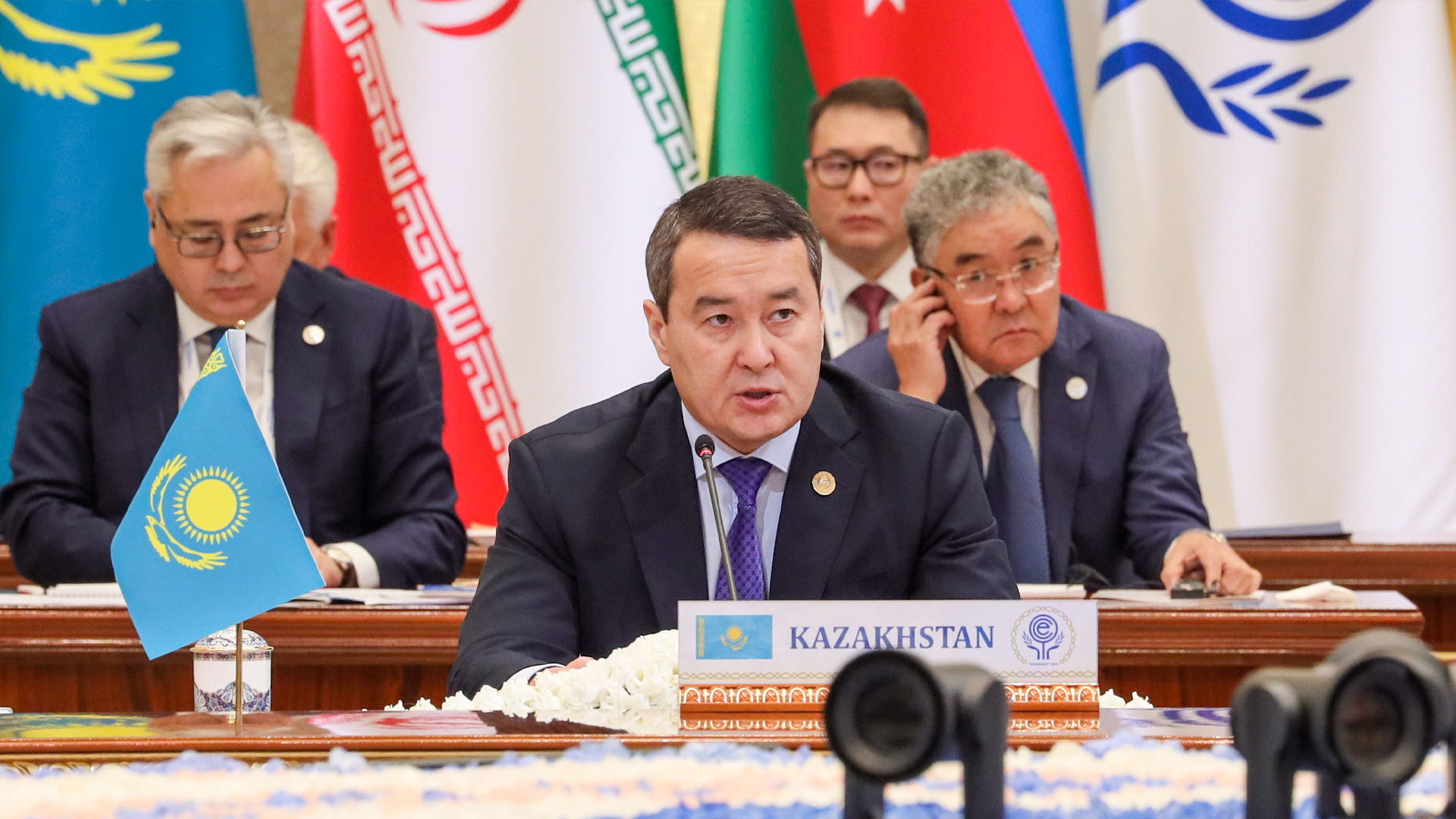ASTANA – Kazakh Prime Minister Alikhan Smailov called for removing administrative barriers and deepening the integration of transport and logistics systems at the 16th Economic Cooperation Organization (ECO) Summit on Nov. 9 in Tashkent, reported the Prime Minister’s press service.

Alikhan Smailov at the 16th Economic Cooperation Organization Summit. Photo credit: primeminister.kz.
The summit, chaired by President of Uzbekistan Shavkat Mirziyoyev, was also attended by President of Azerbaijan Ilham Aliyev, President of Iran Ebrahim Raisi, President of the Kyrgyz Republic Sadyr Japarov, President of Tajikistan Emomali Rahmon, President of Turkmenistan Serdar Berdimuhamedov, President of Türkiye Recep Tayyip Erdoğan, Caretaker Prime Minister of Pakistan Anwaar-ul-Haq Kakar, and ECO Secretary General Khusrav Noziri.
Smailov emphasized the importance of enhancing regional transport connectivity, focusing on developing the Trans-Caspian International Transport Route. Azerbaijan, Georgia, Kazakhstan and Türkiye are implementing roadmaps to eliminate bottlenecks and build the route until 2027 to increase capacity.
Kazakhstan is unlocking the potential of seaports in the Caspian Sea, with plans to build a container hub in the Aktau port and the Sarzha multifunctional terminal in the port of Kuryk. Separate station tracks at checkpoints in China will be constructed for Central Asian countries to increase cargo traffic and reach 500,000 containers per year by 2030.
According to Smailov, a joint roadmap worked out with Iran, Russia, and Turkmenistan will increase the capacity of the North-South transport corridor from 10 to 15 million tons by 2027.
The Prime Minister highlighted the importance of the Kazakhstan-Turkmenistan-Iran railway as the shortest route connecting ECO states in Central Asia and the Middle East, with cargo traffic increasing by 9% to 1.5 million tons to Iran in the first nine months of this year.
Smailov pointed out Kazakhstan’s large-scale projects on constructing cross-border hubs for increased volume of transportation of processed and food products.
He named the Central Asia International Center for Industrial Cooperation on the Kazakh-Uzbek border a focal point in developing modern cross-border trade and logistics infrastructure, planning to build a similar complex on the Kyrgyz border.
Smailov spoke about constructing the Beineu-Shalkar highway to connect Uzbekistan with the western regions of Kazakhstan, which will complete the formation of the Transport Corridor Europe Caucasus Asia’s eighth road corridor.
Regarding industrial cooperation, the Prime Minister highlighted the presence of over 13,000 joint ventures with capital from ECO countries operating in Kazakhstan. Currently, 26 projects in mechanical engineering, metallurgy, light and chemical industries, construction, and subsoil use are estimated at around $2.7 billion.
Smailov stressed the need to strengthen cooperation through stimulating interregional trade. Despite a 3% decrease in trade turnover with ECO countries in the first eight months of the year, Kazakhstan is ready to boost these indicators by exporting an additional average of nearly 100 types of goods to each ECO country.
At a meeting with President Mirziyoyev, Smailov highlighted the robust trade relations between the two countries, accounting for nearly 70% of all trade in Central Asia, and voiced the objective to increase mutual trade to $10 billion.
Established in 1985 by the countries of Central Asia and the Middle East, ECO is a regional interstate economic organization and the successor to the Organization for Regional Cooperation for Development, which operated based on the Izmir Treaty, signed by Iran, Pakistan, and Türkiye on March 12, 1977.
Since 1992, the activities of the ECO have intensified significantly due to the accession of seven new states – Azerbaijan, Afghanistan, Kazakhstan, the Kyrgyz Republic, Tajikistan, Turkmenistan, and Uzbekistan.
